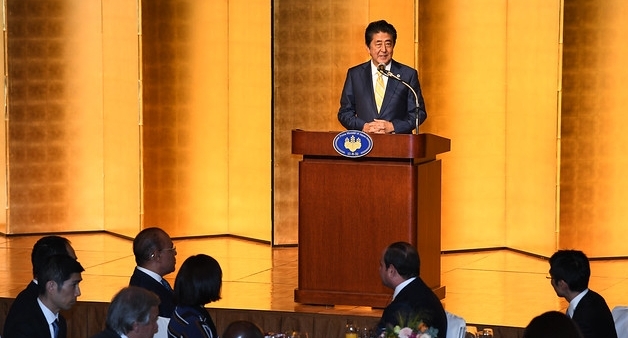TICAD7 sees signing of 110 MoUs with 26 African countries
The Seventh Tokyo International Conference on African Development (TICAD7) was held from August 28-30, 2019 at Yokohama, Japan.

August 31, 2019: The Seventh Tokyo International Conference on African Development (TICAD7) was held from August 28-30, 2019 at Yokohama, Japan. The theme this year was "Advancing Africa's Development through People, Technology and Innovation."
Furthermore, during this forum, a ceremony to commemorate a total of 110 memorandums of understanding (MoUs) being signed on the occasion of TICAD 7 between 37 Japanese companies and 5 organisations and 26 African countries and others were conducted in the presence of Emmerson Dambudzo Mnangagwa, president of the Republic of Zimbabwe; Hiroshige Seko, minister of economy, trade and industry; and Masahisa Sato, state minister for foreign affairs of Japan.
The government of Japan has been leading this conference since 1993, co-hosted by United Nations, United Nations Development Programme (UNDP), World Bank and African Union Commission (AUC). Over the past three years, Japanese private investment into Africa reached $20 billion dollars. Africa was consistently one of the main themes at the G20 Osaka Summit and the G7 Summit 2019 in Biarritz, France.
On August 28, a welcome reception was co-hosted by Shinzo Abe, prime minister of Japan, and Fumiko Hayashi, mayor of the city of Yokohama, for the head of states and organisations assisting the TICAD7. During his opening speech, referring to the fact that it is the third time that TICAD has been hosted by the city of Yokohama, Abe mentioned that TICAD had triggered companies in Yokohama to expand to Africa. Hayashi stated that Yokohama will continue to progress hand-in-hand with African countries.
South African president Cyril Ramaphosa spoke at the South Africa-Japan business forum that African Continental Free Trade Area (AfCFTA) would require world class infrastructure and the continent was undertaking large cross-border projects that would create new opportunities for investors. These projects included liquid natural gas fields in Mozambique, new ports and rail lines across southern Africa and pan-African iron and steel initiatives, with the African Development Bank estimating the continent needed between $130 billion and $170 billion a year to meet its infrastructure needs.
"This TICAD summit is an excellent moment to reflect on how we can deepen our ties and move towards a future of shared prosperity for our countries," Ramaphosa added, calling the summit a clear indication of the strength of the relationship between Japan and Africa.
One of the side events was Japan-Africa Business Expo (Africa Lounge and Japan Fair) organised by the Japan External Trade Organisation (JETRO).
Abe expressed support for prime minister Abiy Ahmed Ali of Ethiopia for his efforts to achieve the peace and stability of the Horn of Africa including the promotion of peace with Eritrea. Prime Minister Abe also stated that Japan will support reforms in Ethiopia such as democratisation, and that, as part of the efforts to support Ethiopia's reform, Japan will support the election in Ethiopia through "The Project for Electoral Support in Ethiopia," a recently signed grant aid through the cooperation with the UNDP.
Abe welcomed Abdel-Fattah El-Sisi, president of the Arab Republic of Egypt's visit to Japan following G20 Osaka Summit meeting in the end of June, and stated that Japan attaches importance to cooperation with Egypt as a regional power. He also expressed his gratitude for leadership of Egypt as the chair of the African Union in the preparation phase of the TICAD 7. Both leaders confirmed their cooperation for the success of TICAD 7.
Japan hosted the launch meeting of Gavi's third replenishment in Yokohama. In addition to Kono, minister for foreign affairs; Dr Seth Berkley, CEO of Gavi; Dr Ngozi Okonjo-Iweala, board chair of Gavi; representatives of donor governments; recipient countries; African countries attending TICAD7; Bill & Melinda Gates Foundation; and global organisations participated in the meeting.
Kono emphasised that it was important to support Gavi's activities which introduce and expand vaccines to contribute to human security and universal health coverage (UHC), which Japan has been promoting. He also expressed his expectations that, with a view to promoting Gavi's efforts, there would be opportunities for debating %u2018domestic resource mobilization', %u2018innovative financial mechanisms' and %u2018finding new donors' in this meeting.
A side event by Sasakawa Africa Association (SAA), %u2018Sasakawa in Africa - building on the past, looking to the future, Africa's youth and entrepreneurship in agriculture'. Abe expressed respect for the SAA's 30-year devoted support for farmers in Africa, while noting the important role that Japanese technology is certain to play in human resource development for African youth and innovation which is essential to transform the agro-environment in Africa.
In his closing session on August 30, PM Abe stated, "We have compiled the results of our fulfilling discussions over these three days into the %u2018Yokohama Declaration 2019' and also the %u2018Yokohama Action Plan 2019,' which serves as the concrete guideposts. With that, we hereby have adopted the same."
Abe expressed his intention that the government of Japan will support the expansion of the Japanese companies in Africa through efforts of the Japan Business Council for Africa among others, and also called upon African governments and private sectors to deepen their understanding on characteristics and advanced technologies of Japanese companies, and to establish long-term partnerships with them.
Other African countries which attended the conference were Togo, Uganda, Senegal, Burkina Faso, Djibouti, Angola, Rwanda, Namibia, Niger, Nigeria, Benin, Zimbabwe, Zambia, Sao Tome, Central Africa Republic, Republic of Cabo Verde, Guinea and among others.


